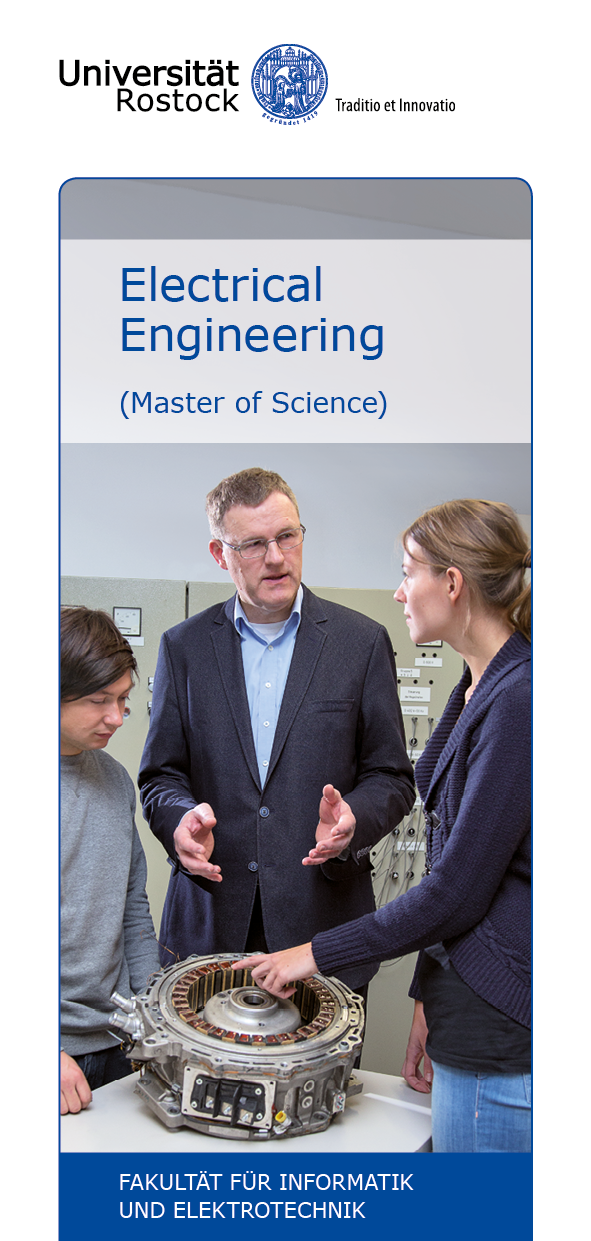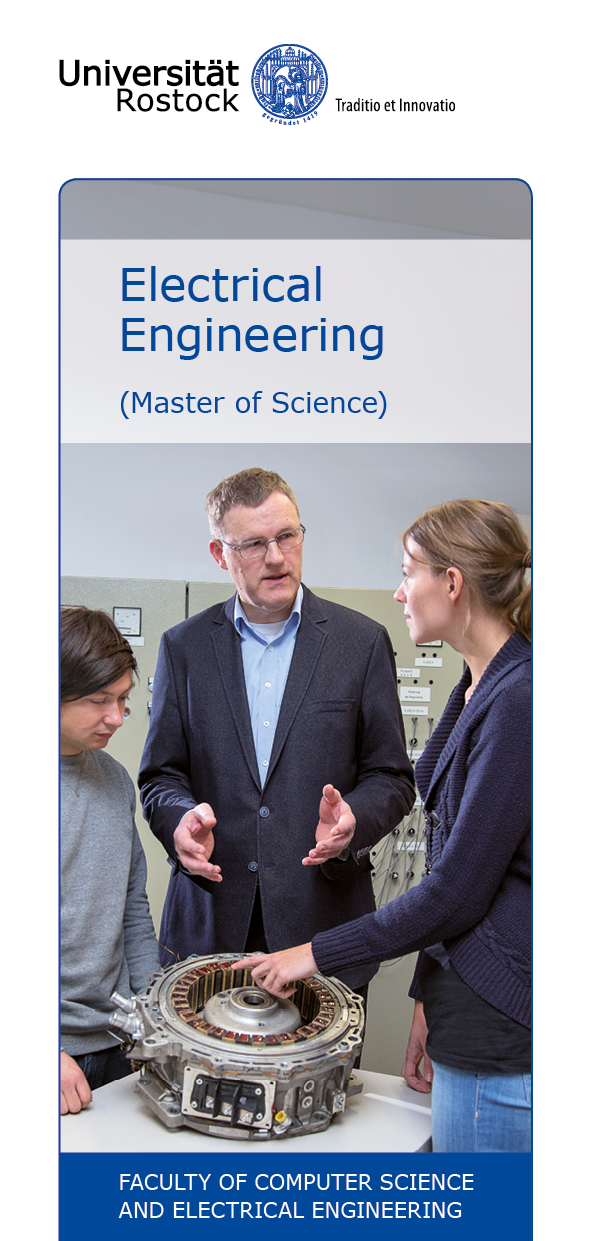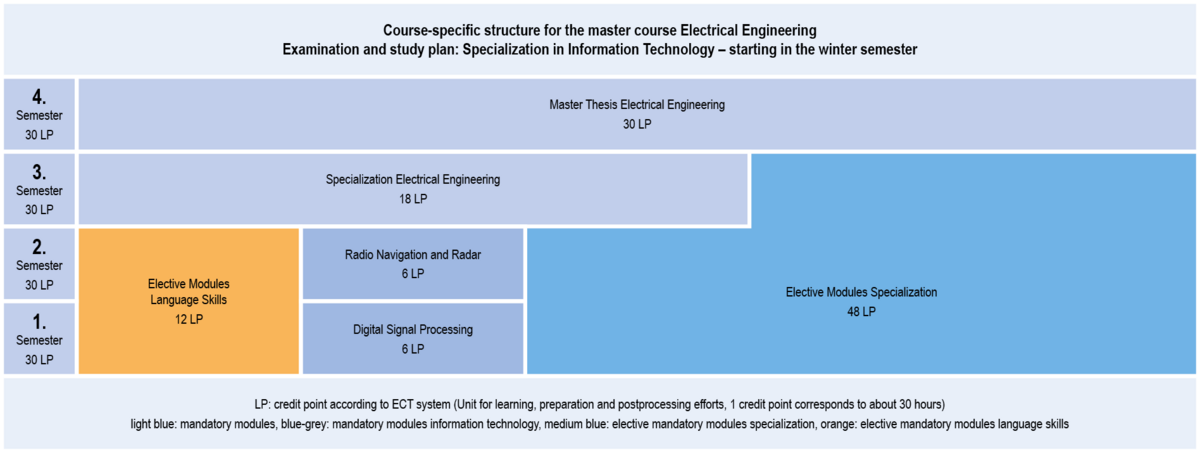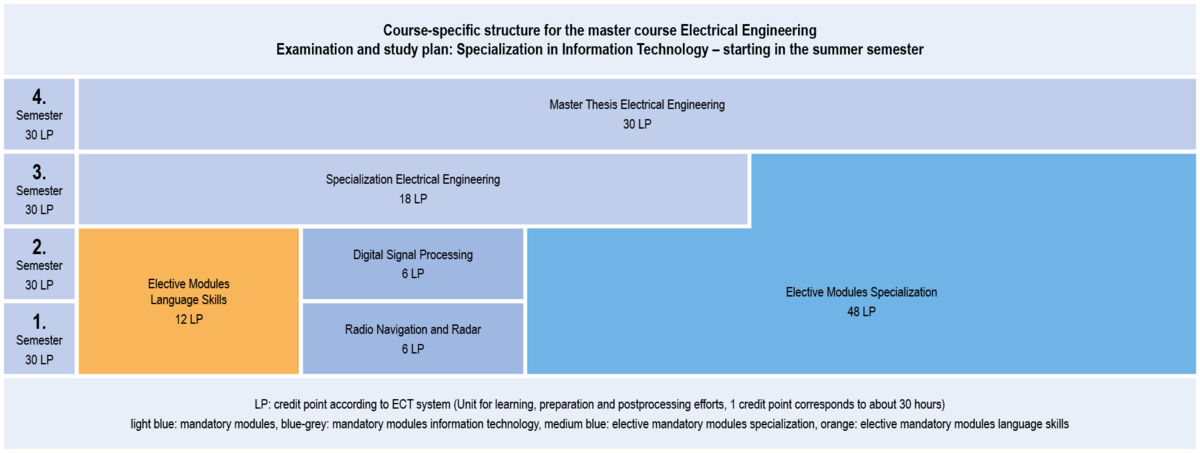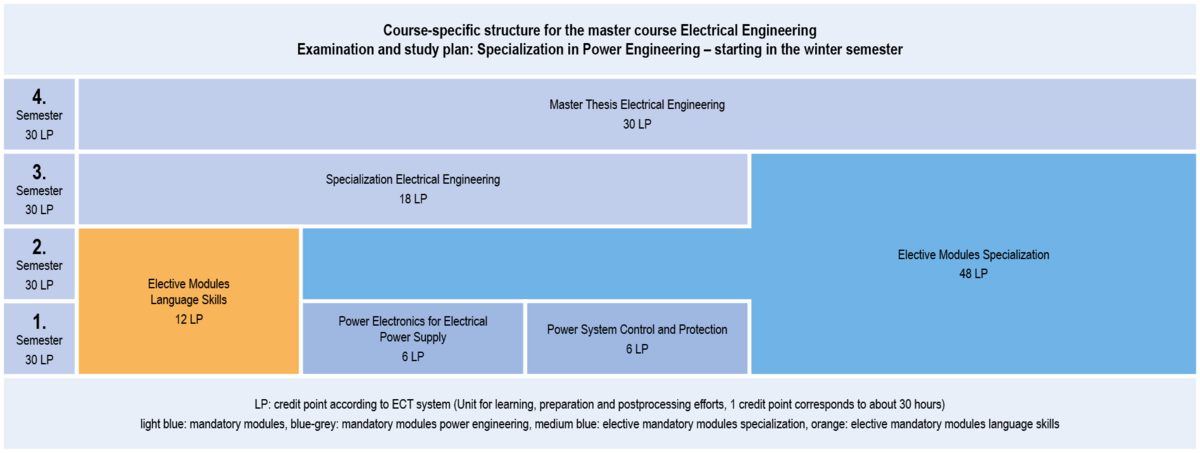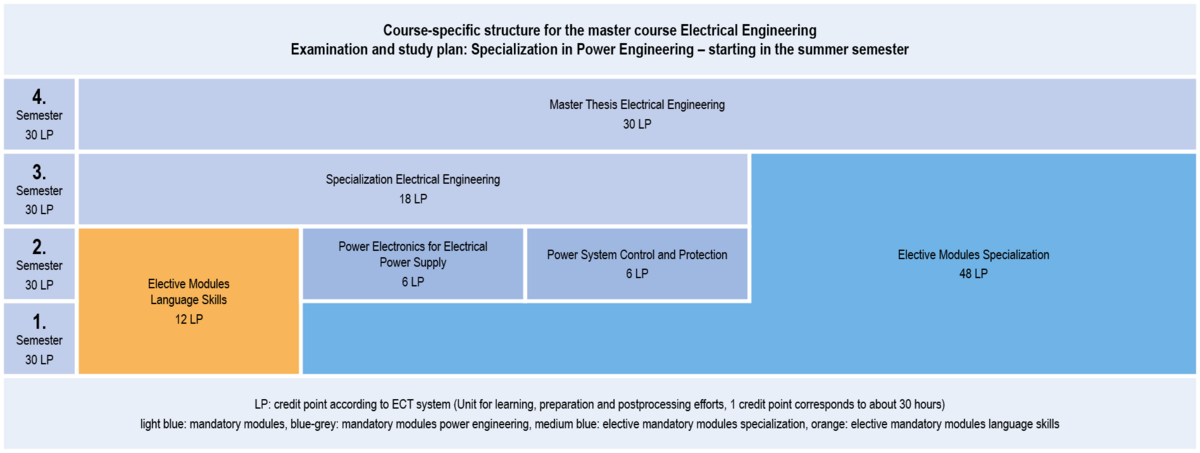Welcome to the Master's degree program Electrical Engineering.
Detailed information on the program according to SPSO from 2024 can be found on this page.
On the web pages of the university you will find a brief overview of general information and information about admission and enrollment.
From the 2024 summer semester, the basis for enrollment in this degree program is the degree program-specific examination and study regulations (SPSO) from 2018 with the 1st amendment from 2022 and the 2nd amendment from 2024 in conjunction with the current version of the general examination regulations for the bachelor’s and master’s programs at the University of Rostock (RPO BSc/MSc).
For modules of foreign faculties that are enrolled in the elective area, the respective SPSOs of the faculties offering the modules, in which these modules are anchored, apply. For the language modules that can be studied in the compulsory elective course, the examination regulations apply to the courses offered by the Language Center of the University of Rostock, including the university foreign language certificate UNIcert®.
The EE course is offered in English and is therefore equally suitable for English-speaking international students and for German-speaking students with very good English skills who are aiming for an international career and who want to use and develop their English language skills intensively in addition to acquiring specialist knowledge.
Information for formerly enrolled students can be found on the website Information for students on older SPSO. Students on older SPSO can be tested upon application under the terms of the current SPSO. The request is irrevocable. Exam and course achievements already achieved are recognized.
Application information for international students
International students: An application is required for this course. Please read the application information.
Degree
- Master of Science (M.Sc.)
- A successful degree entitles you to use the protected professional title of "Engineer".
Study form
- Continuing (with second professional qualification)
- One-Subject-Master (not combinable with other master courses)
- Full-time and classroom study
Languages
- Lecture language is English, some modules with examination in German.
- The entire study ist possible in English.
- If your native language is not German, a German course is a mandatory component.
Normal Duration
- 4 semester / 120 credit points
Start
- At winter semester (October 1th) and at Summer semester (April 1th) possible
Support when starting your studies
- Individual support offers at the start of studies for students who are new to Rostock for their master's degree, including through mentoring by students for students
Fields of study
- Engineering / Electrical Engineering
Formal requirements
- A first professional qualification in a university degree in Electrical Engineering with at least 180 credit points or another equivalent qualification from a vocational academy:
- with at least 85 % of the CGPA (Cumulative Grade Point Average) or another grading system with a comparable grade or Graduate Aptitude Test in Engineering (GATE) with at least 500 points
- Native language English or proof of sufficient English language skills (proof not older than two years):
- TOEFL IBT with at least 94 points or IELTS with at least 7.0 points
- Proof of profound knowledge:
- Electromagnetic Fields and Waves (at least 3 credit points), Mathematics (at least 18 credit points), Programming / Practical Computer Science (at least 6 credit points)
Application / Enrollment
- German prospective students from the University of Rostock need to be rewritten in the student secretariat of the University of Rostock in this degree program
- German prospective students from other universities must enroll online at the University of Rostock in this program
- International prospective students must:
- apply via UniAssist
- after receipt of the admission letter → then enroll in the study program at the University of Rostock
Specializations
- Information Technology
- Power Engineering
Further qualification possibilities
- Graduate to Dr.-Ing.
Accreditation
- Accredited from: 25.06.2019 to: 30.09.2027
Contact
course-specific examination and study regulations / Studiengangsspezifische Prüfungs- und Studienordnung (SPSO)
Please note that the German version of the SPSO is the legally binding document. The unofficial English reading version is intended for better understanding for English-speaking students.
To access the SPSO and the English language reading version, please visit the German language website and then open the menu item "Studienordnung".
Module descriptions
- module list with all modules of this course of study and links to the long descriptions of the modules in the current version (Uni-Web examination portal, language: most in German)
Student advisory service Electrical Engineering / Studienfachberatung Electrical Engineering
Prof. Dr.-Ing. Hans-Günter Eckel
Albert-Einstein-Straße 2 (seminar building / Seminargebäude, Raum 016), 18059 Rostock, GERMANY
fon: +49 (0)381 - 498 7006
ee.ief(at)uni-rostock.de
Study Office and Examination Office Electrical Engineering / Studienbüro und Prüfungsamt Electrical Engineering
Tina Zorn
Albert-Einstein-Straße 26, 18059 Rostock, GERMANY
Room / Raum 005 und 006
Tel.: +49 (0)381 - 498 7006
ee.ief(at)uni-rostock.de
Examination Board Electrical Engineering (chair) / Prüfungsausschuss Electrical Engineering (Vorsitz)
Prof. Dr.-Ing. Hans-Günter Eckel
Albert-Einstein-Straße 2 (seminar building / Seminargebäude, room / Raum 016), 18059 Rostock, GERMANY
fon: +49 (0)381 - 498 7006
ee.ief(at)uni-rostock.de
Student representation Electrical Engineering / Studierendenvertretung Electrical Engineering
Student Council Electrical Engineering / Fachschaftsrat Elektrotechnik
room of the Student Council / Fachschaftsraum: room / Raum 003 and / und 004, Albert-Einstein-Straße 26, 18059 Rostock, GERMANY
Student Project Room: semnar building / Seminargebäude, lab / Labor S 13, Albert-Einstein-Straße 2, 18059 Rostock, GERMANY
fachschaft.e-technik(at)uni-rostock.de
Student Service Center (SSC) of the University of Rostock / Student Service Center (SSC) der Universität Rostock
Info service in the SSC: Central contact point for prospective students and students
The Student Service Center brings together all the important information and advice offered by various institutions for prospective students and students. Those seeking advice should first contact the info service. If necessary, referrals are made here or an individual consultation appointment is arranged.
Parkstraße 6, 18057 Rostock, GERMANY, room / Raum 024
fon: +49 (0)381 - 498 1230
studium(at)uni-rostock.de
contact and office gours: Student Service Center (SSC) of the University of Rostock – Homepage
On the SSC homepage you will find information on which institution is represented at which times in the SSC.
General Student Advisory Service & Careers Service / Allgemeine Studienberatung & Careers Service
General Student Advisory Service of the University of Rostock / Allgemeine Studienberatung der Universität Rostock
Brief advice on choice of course, reorientation and course of study
Parkstraße 6, 18057 Rostock, GERMANY, room / Raum 024
fon: +49 (0)381 - 498 1234 and +49 (0)381 - 498 1230
studium(at)uni-rostock.de
contact and office hours: General Student Advisory Service
Student's office / Studierendensekretariat
Student's Office of the University of Rostock / Studierendensekretariat der Universität Rostock
Contact point for questions about admission, registration and re-registration
Parkstraße 6, 18057 Rostock, GERMANY, room / Raum 024
fon: +49 (0)381 - 498 1230
studierendensekretariat(at)uni-rostock.de
contact and office hours: Student-Service-Center
Rostock International House (RIH)
Rostock International House (RIH) of the University of Rostock
Point of contact for questions about study visits abroad (outgoing), studying in Rostock for international students (incoming) and prospective refugees (refugees)
Kröpeliner Straße 29, 18055 Rostock, GERMANY
fon: office: +49 (0)381 - 498 1209 and +49 (0)381 - 498 1700
info.rih(at)uni-rostock.de
contact and office hours: Rostock International House (RIH) – Contact and opening times
The studies of the master course Electrical Engineering may be commenced in the winter semester or in the summer semester.
Students who choose this master course may specialize in one of this two specializations:
- Information Technology
- Power Engineering
Students who choose the specialization Power Engineering are recommended to commence their studies in the winter semester. If they choose to commence in the summer semester, they are recommended to consult the departmental study advisor for planning their studies due to the limited options to attend classes.
The mandatory indication of the chosen specialization must be given in written form in the registration for the final examination.
The master course is divided into obligatory and elective modules.
- module list with all modules of this course of study and links to the long descriptions of the modules in the current version (Uni-Web examination portal, language: most in German)
In both specializations, modules worth 60 credit points must be studied in the mandatory area and modules worth 60 credit points in the mandatory elective area. In the compulsory elective area of specialization, 42 credit points must be chosen from the catalog of the chosen specialization and six credit points from the catalog of the non-selected specialization; In addition, there are twelve credit points from the mandatory elective area of language skills. For the mandatory modules, twelve credit points are allocated to the basic modules required for the specialization, 30 credit points to the final examination and 18 credit points to the specialization module. The basic modules required for the specialization are the modules “Digital Signal Processing” and “Radio Navigation and Radar” for the specialization “Information Technology” and the modules “Power System Control and Protection” and “Power Electronics for” for the specialization “Power Engineering”. Electrical Power Supply”. In order to pass the master's examination, a total of at least 120 credit points must be acquired.
For the elective modules
- Selected topics in the field of models and algorithms
- Selected topics in the topic information systems
- Selected topics in the field of smart computing
the Institute of Informatics publishes a list of course offerings no later than six months before the beginning of a semester. There is an offer consisting of a lecture in the amount of three semester hours per week and an accompanying exercise in the amount of one semester hour per week.
The courses to be taken as part of the elective modules can be chosen freely from the current list of course offerings. It is not permissible to use one and the same course offer multiple times.
Participation in individual modules of this program depends on the proof of certain previous knowledge or skills. Details can be found in the respective module descriptions.
Students with knowledge of German at the level B2 of the Common European Framework of Reference for Languages have to attend, after consulting the Fachstudienberatung, modules in the amount of 12 credit points from the module offer of other courses of study of the University of Rostock.
For the language modules, which are studied in the context of the study, the examination regulations apply to the courses offered by the Language Center of the University of Rostock including the university foreign language certificate UNIcert®.
Instead of the elective modules expressly offered for this study program, further modules from the module range of other study programs of the University of Rostock or other universities can be chosen and in accordance with § 19 of the Framework Examination Regulations (Rahmenprüfungsordnung Bachelor / Master), taking into account the qualification objectives of the respective optional subject area in consultation with the subject specific student counseling (Fachstudienberatung) and the corresponding module managers be acknowledged. The examination board (Prüfungsausschuss) decides on the recognition in individual cases. The decision of the examination board should be made at the request of the student before the beginning of the semester in which the module to be recognized should be taken. The attendance of such modules at the University of Rostock presupposes that they are not modules of a restricted admission program, unless a corresponding teaching export is stipulated in terms of capacity law and sufficient study place capacities are available. The admission requirements, examination requirements, examination periods as well as provisions on the form, duration and scope of the module examination, which are provided for in the examination regulations of the respective degree program, apply.
Please note that the courses on offer below are usually only once per academic year - i.e. in the winter semester or in the summer semester. You can obtain information on this from the SPSO or the student office. The division according to SPSO is shown below.
Of course you are free to attend additionally any lecture of the University of Rostock. You can obtain credit points by this courses. For counting of these credit points up to your studies or list this lectures additionally at your masters certificate please ask the students office before. Normally it is necessary to submit an application. The University of Rostock offers a broad spectrum of subjects and lectures. You will have interesting opportunities to get additional knowledge and skills.
Compulsory elective area specialization
Modules totaling 42 credits must be selected from the catalog of the chosen specialization and 6 credits from the catalog of the non-selected specialization.
Winter semester
- Advanced CPU Design
- Advanced VLSI Design
- Automation Technologies
- Bild-/Videoverarbeitung und Codierung / Image/video processing and coding
- Cloud Computing (Angebot unregelmäßig) / Cloud computing (offer irregular)
- Computational Intelligence in Automation
- Data-Driven Methods in Signal Processing
- Datengetriebene Simulation / Data-driven simulation
- Echtzeitsysteme / Real-time systems
- Fortgeschrittene Elektronik und Schaltkreisentwurf / Advanced electronics and circuit design
- Intelligente Prozessinformationsverarbeitung / Intelligent process information processing
- Kanalcodierung / Channel coding
- Mensch-Computer-Interaktion und Interaktionsdesign (Angebot unregelmäßig) / Human-computer interaction and interaction design (offer irregular)
- Mobilkommunikation / Mobile communication
- Netzwerksicherheit (Angebot unregelmäßig) / Network Security (offering irregular)
- Photonische Systeme / Photonic systems
- Rechnerarchitekturen für Deep Learning Anwendungen / Computer architectures for deep learning applications
- Selected Topics in Embedded Systems Design
Summer semester
- Aktuelle Themen der Nachrichtentechnik / Current topics in communications technology
- Anforderungsanalyse (Angebot unregelmäßig) / Requirements analysis (offer irregular
- Cybersecurity (Angebot unregelmäßig) / Cybersecurity (offer irregular)
- Digitale Datenübertragung / Digital data transmission
- Event-Driven Architectures (Angebot unregelmäßig) / Event-Driven Architectures (offer irregular)
- Explainable Artificial Intelligence (XAI) (offer irregular)
- Hardware/Software Co-Design
- Hochfrequenztechnik / High frequency technology
- Intelligent Information Systems: Advanced Artificial Intelligence (Angebot unregelmäßig) / Intelligent Information Systems: Advanced Artificial Intelligence (Offer irregular)
- Project Seminar Virtual Acoustics
- Projektseminar Funkkommunikation / Project seminar Radio communication
- Selected Topics in VLSI Design
- Verteilte eingebettete Systeme / Distributed embedded systems
Winter semester
- Automation Technologies
- Bioenergie und Energieerzeugung aus Abfällen / Bioenergy and energy production from waste
- Computational Intelligence in Automation
- Dynamic Behavior of AC Machines
- Fehlerdiagnose und Fehlertoleranz in technischen Systemen / Fault diagnosis and fault tolerance in technical systems
- High Voltage and Current Systems
- Modeling and Simulation of Mechatronic Systems
- Power System Static Analysis
- Projektseminar Entwurf und Simulation elektronischer Baugruppen / Project seminar design and simulation of electronic assemblies
- Renewable Energy: Grid Connection, Controller Design and Grid Code Requirements
Summer semester
- Compact Modeling of Large Scale Dynamical Systems
- Einführung in die digitale Umrichtersteuerung / Introduction to digital inverter control
- Hochtemperaturelektronik - Konstruktion und Fertigung / High temperature electronics - design and manufacturing
- Moderne Windenergieanlagen / Modern wind turbines
- Power System Dynamic Stability and Control
- Project Seminar Power Electronics
- Simulation of Power Semiconductors
Compulsory Elective Area Languages
Visit of two modules according to the classification by the Language Center. If you have the necessary knowledge of German, you may also be classified in a higher course.
Students with knowledge of German at the level B2 of the Common European Framework of Reference for Languages have to attend, after consulting the Fachstudienberatung, modules in the amount of 12 credit points from the module offer of other courses of study of the University of Rostock.
Time schedule
At the beginning of the semester, a schedule for the entire semester will be provided via notice.
It includes lecture periods, examination periods, semester breaks, and the commencement of the subsequent semester.
Based on the examination and study plan, the study administration office develops a semester curriculum for each register and each semester in cooperation with the instructors responsible for the single modules. The semester curriculum contains information on the subjects, the instructors, the time exposure of the different class structures, and the dates of classes.
Teaching and training forms
The studies’ contents are taught in different classes.
The different kinds of classes are signified by the practice of different forms of teaching and learning. Usually, classes are offered only once a year.
The following kinds of classes are deployed in the master course:
- Excursion: Excursions are courses that take place in a non-university environment. These include, for example, study trips or field internships, which are carried out for technical reasons in practice-oriented environments or at external study-relevant locations.
- Consultation (to supervise scientific work): Consultations are individual counseling sessions between students and teachers. The students produce long-term scientific studies or thesis. The teacher will inform himself at regular intervals about the status of the work and give suggestions.
- Internship event: An internship event is an internship at the university, which, unlike non-university internships, is a supervised course. It is an exercise to apply acquired theoretical knowledge to specific practical issues, to practice scientific methods and techniques by practical application and to deepen the contents of the module and to train their own work organization.
- Practical school practice: In a practical school exercise, students teach under instruction individual lessons at a school facility.
- Seminar: In a seminar, the students will have the opportunity to present their own findings, to put them up for discussion and to present them in written form. Seminars can be conducted as a presence or online event.
- Tutorial: A tutorial is a course that is carried out by academic or student assistants to supplement a course in accordance with a study regulations. The responsibility for the technical and didactic care lies with the institution or the scientific or artistic staff to which the assistant is assigned.
- Exercise: In an exercise that is not predominantly practical in nature, the students work on given exercises to deepen and apply the knowledge and the imparting of subject-specific skills and abilities. An exercise offers the opportunity to ask questions, to discuss solutions to problems and to use means of self-control of the achieved level of knowledge.
- Lecture, Repetition: In a lecture or a repetition, the students will be presented with the curriculum primarily as a lecture of the teacher with the support of media (panels, slides, scripts). Lectures or repetitions can be carried out as a presence or online event.
- Integrated course: An integrated course combines the lecture with more active forms (eg seminar or exercise) in which the students themselves elaborate given topics on the basis of literature and represent them in the circle of the participants of the event and can discuss.
- Project event: In the project event, students work on a project topic in individual or group work under supervision of a lecturer.
The achievement of the aims of study is dependent on the participation in classes as well as the accompanying self-study.
If specified in the module descriptions, in accordance with Section 6b of the general examination regulations (Bachelor/Master) you must regularly take part in seminars, exercises and internship events as a prerequisite for the examination.
For courses where regular or active participation of the candidates in the course is required to achieve the learning objective, compulsory attendance may be compulsory, provided specific techniques, didactics, knowledge and skills are taught in the specific course in pure self-study can not be learned or only with considerable restrictions. The corresponding types of events are specified in the study program-specific examination and study regulations (SPSO) and must be identified as such in the respective module description. The requirement of regular attendance is deemed met if no more than 20 percent of the sessions of the course were missed without excuse. Also during the study excursions can be carried out, in which to achieve the learning objective is to participate. If the requirement of regular participation is not fulfilled, no admission to the module examination takes place.
Absence is always to be excused before the start of the event or the excursion, stating the reason (usually by e-mail); If this is not possible in individual cases, the apology must be made immediately afterwards. If the lecturer does not find a valid reason for not attending, the absence is considered as unjustified.
Can the candidate make a written statement and make it convincing that for reasons beyond his control (eg own illness, care for a sick or otherwise needy close relative, pregnancy, death of a close relative) have come to longer absences the lecturer decides whether the actual participation time can still be counted as regular participation. The same applies if it was not possible to take part in an excursion or only partially. With regard to the absence of time, the provision of an adequate equivalence performance can be specified. The nature of this compensatory benefit will be determined by the instructor at its sole discretion. The time required to provide them may not exceed twice the duration of the missed teaching time.
If the requirement of regular participation is not met by the candidate and no equivalence service can be provided, this must be reported in writing by the lecturer, stating the reasons, to the examination board (Prüfungsausschuss). The latter issues a decision, which must be provided with a legal remedy. Against the decision, the objection to the examination board is admissible.
The composition of the modules to be attended, the type of examinations, the type, duration and scope of the module examinations, the regular exam date and the credit points to be achieved follow from the examination and study plan and the module descriptions.
The final exam (master thesis and colloquium) is part of the Master's examination.
In particular, the following examinations are used:
written examinations
- Report / Documentation: A report (also documentation) is a factual representation of an event or the structured presentation of facts. A report can be in the form of a portfolio. A portfolio is an orderly collection of written documents or own works. Examples of reports are: internship documentation, interviews, research reports, journalistic articles and literature reports.
- Essay: An essay is a short essay in which a limited topic is discussed in an over-the-topical and informal way. It is more about the development of a guiding idea or a preliminary idea than the stringent presentation of complex content. The essay must satisfy the substantive objectivity and identify sources of quotes or suggestions.
- Homework: A homework is a written elaboration on a given topic or the written processing of a task. Students should be able to demonstrate that they can tap sources of literature within a limited space of time, that they can present reflected texts in their own words in an independent context of argumentation and that they can independently and completely work on tasks. Possible special forms of a term paper may in particular be a case study / case analysis, a lesson draft / lesson design, a research exposition or a design draft. In addition to the housework, a presentation of the topic may be required.
- Exam: In an exam, the students have to work under written supervision in a given time without or with limited resources.
- Protocol: A protocol is an accurate, essentially transcript of the course of an investigation, an experiment or the course of an event.
oral examinations
- Colloquium: Questions will be asked by a knowledgeable auditorium following a presentation of the student's own work.
- Oral examination: In an oral examination, students should answer questions on one or more examination topics orally.
- Presentation: A presentation is a presentation on a scientific topic and summarizes the research results, the results of the study and / or the results of a literature study. With the help of a sensible use of media essential contents of the used literature should be briefly presented, explained and questions formulated for further discussion. In addition to the presentation, a handout, a thesis paper or a written version of the presentation may be required.
practical examinations
- Practical Examination: In a practical examination, students should demonstrate competences for performing professional or professional activities or their own practical, sporting or artistic abilities. Possible forms of practical exams include: school practice exam, bedside exam, role play, simulation game, moot court, sports exam, music exam.
- Project work: The project work is an open type of examination with a high degree of freedom. Project work should be done individually or by several students within one semester. The basis for the examination is both the result of the project work as well as its documentation and the process of the group work itself. The results of the work can, for example, be presented in a portfolio.
Preliminary examination requirements can be determined in a module in accordance with Section 7 Paragraph 2 of the Framework Examination Regulations (Bachelor/Master).
Preliminary examination requirements can be:
- Mandatory attendance
- Successful processing of a seminar topic: The students independently work on a practical or theoretical topic individually or in groups according to the instructions of the teacher and present the results.
- Computer science project: The students work on project tasks (e.g. programming tasks) individually or in groups, which are presented and evaluated during the course of the event in the form of lectures, written elaborations or submission of source code according to the instructions of the lecturer. In this way, students demonstrate that they have understood the subject matter covered and can apply it creatively.
- Homework: Outside of attendance times, students independently work on tasks set by the teacher.
The specific preparatory examination requirements can be found in the respective module description as well as the examination and study plan (SPSO Appendix 1).
The course-related module examinations will be taken during the specified examination period. The examination period of a semester begins immediately after the lecture period and ends at the end of the semester.
By way of derogation, the module examinations in the form of abstracts, presentations, reports and project work may be taken during the course of the event if the students are informed at the latest in the first lecture week about the type of examination applicable to them, their scope and the respective deadline. In agreement between students and examiners, examinations may be held at other times, subject to the deadlines and application modalities specified in the framework examination regulations (Rahmenprüfungsordnung Bachelor / Master).
If students and examiners agree, examinations can also be held at other times in coordination with the examination board, while adhering to the deadlines and registration modalities specified in the general examination regulations. In this case, the study office must be informed in good time.
The declaration of withdrawal of the application for module examinations must be made in writing to the student office. The same applies to the application for the evaluation of a module examination as a free test.
In the case of the last examination attempt, the examiner decides whether an oral examination should be carried out in deviation to the form of examination specified in the module description. This selection must be made uniform for all students of a semester.
In the case of a change in a module description, repeat examinations must be taken in accordance with the module description in the version that applied to the examination to be repeated.
In accordance with Section 29 Paragraph 7 Sentence 1 of the State Higher Education Act and the following paragraphs, the student can declare to the examination board no later than two weeks before the start of a semester that in the following two semesters he/she will only receive approximately half of the amount required for him/her can spend the working hours planned for studying.
The application must specify which of the intended modules or module parts are not provided and in which subsequent semesters the corresponding offered modules or module parts are to be made up. If the examination committee approves the application, it may provide for the retrofitting of modules or module parts other than those specified in the application, in particular if this is necessary to ensure proper study. In hardship cases, the application can also be made at a later date.
The application must be sent to the examination board (Prüfungsausschuss) and submitted to the study office (Studienbüro). If the decision differs from the application, the student is to be heard in advance. The application can be withdrawn up to two months after the start of the semester.
In the case of approval, one semester is not counted towards the standard period of study and, accordingly, is disregarded in the calculation of the periods specified in § 9 and § 10 of the Framework Examination Regulations (Rahmenprüfungsordnung Bachelor / Master). During part-time studies, examinations other than those specified in the decision of the Examination Board can not be effectively taken; a double study during this time is inadmissible. Otherwise, the rights and obligations of the students concerned remain unaffected.
Each student can use the scheme a maximum of two times.
The university master's degree in the field of Electrical Engineering offers the best opportunities to get a conductive or research-based engineering job in Germany and over the world.
The rapidly increasing demand for engineers in the fields of electrical engineering, computer science and information processing opens up prospects for the future with good job opportunities and excellent career opportunities.


